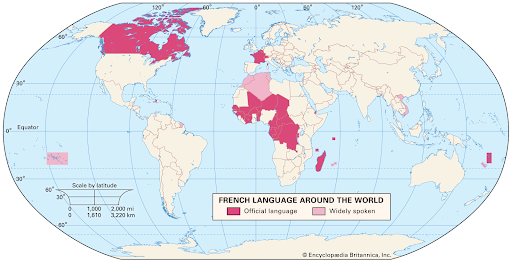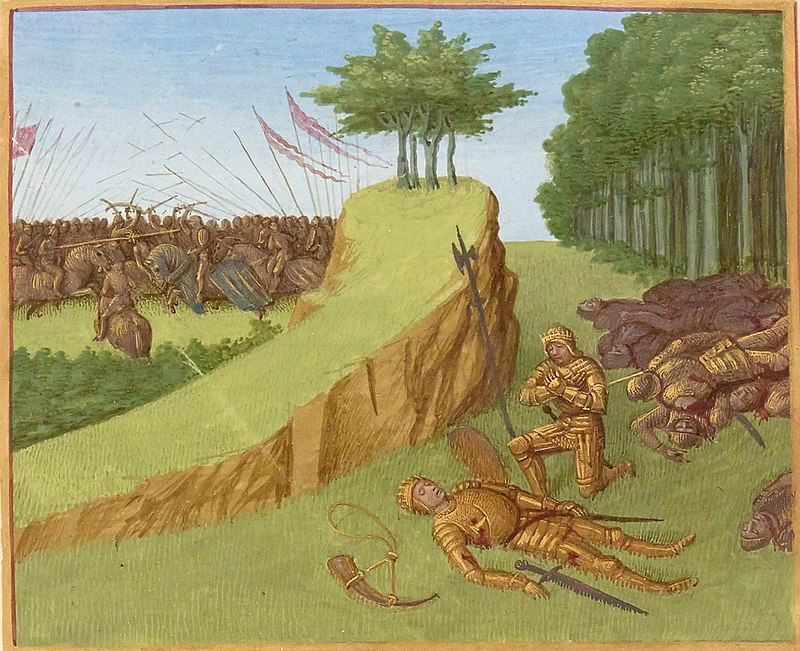

The French language has made an amazing transformation over the last fifteen-hundred years from an off-shoot dialect of a dying empire into one of the most prominent languages on the planet. At the start of the 21st Century, nearly 30 countries regarded French as an official language.
The story of the French language spans centuries and continents, and the aspects that make it unique are difficult to summarize in a single article. We will, however, be taking a quick look at the history of French and some of the characteristics that set it apart from the other Romance languages. By the end, you should have a better understanding of how the language formulated and why it is still so unique today.
A Brief History of the French Language
Even a brief history of the French language can extend well past the scope of a single article if one attempts to cover every possible facet of development. Instead, for our quick history of the French Language, we will look at a handful of critical events that arguably had the most significant impact on the development of the language as we know it today.
The Roman Empire would incorporate the majority of the region we know of as France by 50 BCE at the close of the Gallic Wars. This province would be referred to as Gaul and would be a relatively civilized part of the Empire for the better part of five centuries. Latin would become a dominant language of trade as roads and aqueducts began to spring up across the countryside. In this period, the Celtic Gaulish language would be heavily mixed with common oral Latin referred to as Vulgar (from the Latin "vulgus," which means "the people"). Some Gaulish words still exist in French, such as chêne (oak) and caillou (stone).
Once the Romans' political structure had failed entirely in Western Europe (around the 5th Century), multiple petty kingdoms began to arise from the ashes. They started what we know of traditionally as the dark ages in Europe.
- King Clovis and his Gallo-Roman forces were able to consolidate power in the region and carve out the extensive Kingdom of the Franks. The Germanic nature of the Franks left its mark on the French language with new sounds like the [ø] in nœuds. The most famous of these Frankish kings, and the character known today as the grandfather of Europe, was Charlemagne.
For the next few centuries, these cultures and languages would evolve and adapt and begin to form the first hints of the language we recognize as French. While there is debate over what the first official French language document is, by the year 900, we can safely say multiple 'French' dialects existed.
The Song of Roland is an 11th-century epic poem and is considered one of the greatest pieces of early French literature.
France in the middle-ages was a tumultuous place with kingdoms and Duchies appearing and disappearing with the tides of war. For example, the regions of Burgundy, Provence, and Brittany all had periods of varying autonomy and independence. Eventually, Paris would come to dominate these regions through political maneuvers, familial relations, and warfare. As the French Monarchy grew in power and began to consolidate its control over greater France, one of the avenues of cultural dominance it took was to codify the official language of its Empire.
The legal reform was enacted in 1539 and was known as the Edict of Villers-Cotterêts. This edict legally-established Francien as the only language of the Empire. Other dialects and languages were actively discouraged. Through the last few centuries, multiple initiatives have been made in France to eliminate the various local dialects. In 1635 The French Academy was established to rule over the language, and though it took a short hiatus during the revolutions, Napoleon reestablished it. The French Academy is still, to this day, charged with publishing the official French Dictionary.
France's power on the world stage was immense, and the French language dominated large swathes of international trade and diplomacy until English, along with the economic powers of Britain and the United States, began to supplant it in the 19th and 20th Centuries.
Today still, the French language has those who wish to further perfect or reform it.
Image from Encyclopædia Britannica, Inc.
Some French Language Characteristics
French language characteristics are many and varied. Some of the more defining characteristics include its grammar being simplified from what we see in Latin, and often having the distinguishing of masculine and feminine in the article or adjective rather than the noun. French is noted for having nasal vowels and the uvular 'r'.
Another critical French language characteristic worth noting is something it has in common with many languages that come from Latin. The pronunciation and sounds had changed so much over time that the spelling of a word is often not a good indication of what it sounds like.
Canadian French is amongst the more unique variations of French with less lip movement, some sound change, varying articulation, and a 'more monotonous intonation.' There are plenty of minute linguist facts about the language. French and Canadian French have a long and interesting history all their own.
Interesting French Language Facts
We might as well end with some interesting facts about the French language. The following are some interesting and enlightening facts about the language. French and France relevant facts:
- Along with English, French is the only language that can be found being taught in every country on the planet.
- The French language has roughly 130,000 words.
- In the United States, it is estimated that half of the foreign films being watched are in French.
- To this day, millions of people in South-East Asia use French as their connecting international language.
- Just under half of the modern English words come from French.
- With around 75 million tourists a year, France is the most visited country in the world.
- The French Academy was the first organization (17th Century) known to be made specifically to dictate the course of a language.
- Other Languages spoken in France by percentages: Arabic (3.6%); Portuguese (1.5%); Spanish (1.2%); Italian (1.0%). There are many more languages spoken in France by percentages that are less than 1%.
If you would like to learn more interesting facts about the French language, or even learn to speak French yourself, sites like The French Experiment are a great place to start.

















